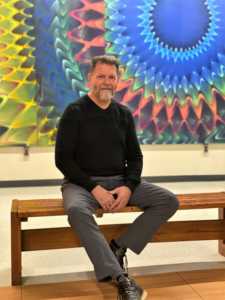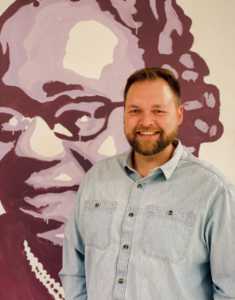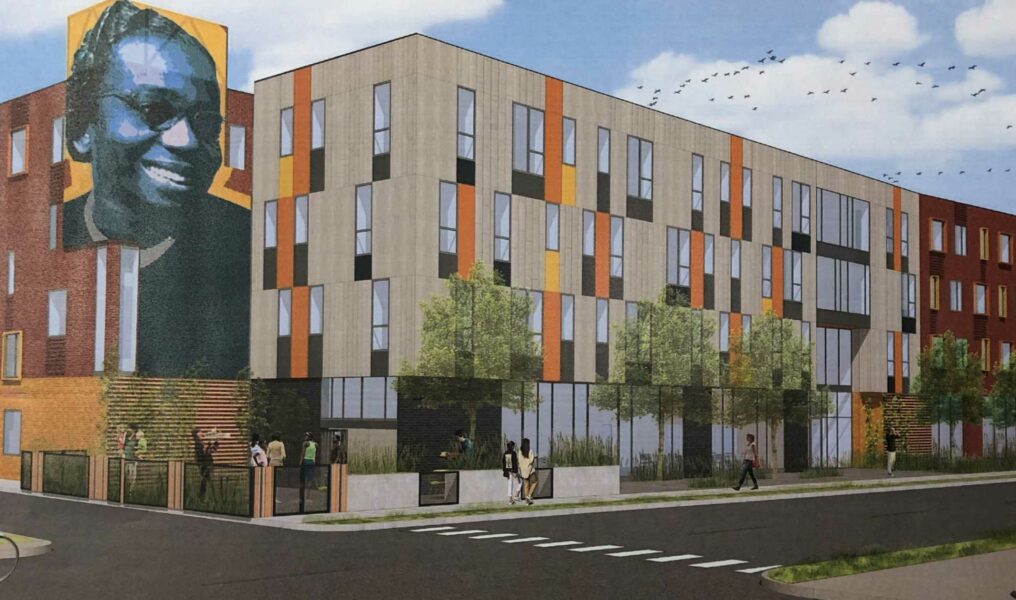As the novel coronavirus pandemic's second wave continues its resurgence in full force, sending much of Europe back into lockdown and last week recording more than 100,000 new U.S. cases in a single day, people across the U.S. have been forced to rely on nonprofits and social services to get them through the devastating recession that has arisen as a result COVID-19. But just as Americans are flocking to them for aid, time-honored nonprofit organizations like the YMCA have been forced to shutter locations, reduce staff and lessen provided services as they themselves deal with the COVID-19's impact. But despite this pattern, one Michigan organization seems to be bucking that trend. The Ruth Ellis Center, located in Highland Park, is a nonprofit agency that serves homeless and at-risk LGBTQ youth as young as 4 and up to 30 years old. It has not only remained stable during COVID-19 but it is in the middle of an unprecedented expansion.
Right now in its 21st year, REC is announcing three brand-new projects: a new 43-unit apartment building to provide permanent supportive housing called The REC Center at Clairmount, a rapid re-housing project that partners with local landlords to house people in immediate need and the Kelly Stough Project, which will aid survivors of sex trafficking and exploitation who lack stable shelter. These steps forward will also signify the end of Ruth's House, REC's existing residential foster care facility. REC Executive Director Jerry Peterson said that removing Ruth's House Services will free up resources from managing the only nine-bed facility to allow for more effective, specialized care.

REC Executive Director Jerry Peterson. Courtesy photo.
Project Development
The REC at Clairmount
Though each of the three projects is being announced simultaneously, they all have gone through unique planning processes and will start services independently. Arguably the most ambitious is The REC Center at Clairmount, which will allow LGBTQ people experiencing homelessness and in need of shelter to have housing support that's not time-limited. REC is set to break ground on the year-long construction project, located in Detroit's North End neighborhood, this month. REC Executive Director Jerry Peterson said that planning for this $16 million project began five years ago when he had discussions with the McGregor Fund — a Detroit-based philanthropic organization dedicated to, among other causes, aiding housing needs.
"We have been at this since then. The next layer was doing a lot of focus groups with young people. And from the very beginning [the approach] has been, 'If we build a project that builds on the assets of the family network and lived experience of trans women of color in building this project, [it can function] in a way that really takes their family and social networks as an asset in stabilizing their lives and helping them move forward as they choose," Peterson said.
Targeted toward, but not limited to, aiding transgender women of color, the Clairmount location will provide 43 units of housing, a ground-level cafe and beauty bar for skills training and integrated services, case management services, neighborhood engagement projects, a behavioral health and primary care center and serve as the new permanent location of the Ruth Ellis Institute, which provides research-based content and training for foster care providers and workers in the juvenile justice system. Residents will also have access to an in-house peer-leader and mental health therapist.
"There will be two full-time case managers in the building, there will be a full-time mental health therapist and there will be a full-time peer support who will actually live in the building," he said. "So there will be a team of four people who will be present all the time and available to the residents, working intensively with them in terms of social supports, job supports and then, of course, in the building we're working toward youth entrepreneurial projects where people can live and potentially work in the building."
Though still called "youth" entrepreneurial projects, Peterson said that there will be no upper age limits on anything that the Clairmount location provides and that the length of time residents can stay is indefinite. However, the units are intentionally constructed to be small, to both maximize the number of people who can be helped at any given moment and to encourage residents to "aspire to" different housing when moving on. Luke Hassevoort, a licensed social worker at REC and the person spearheading the Center's rapid re-housing project, summed up the purpose of Clairmount well.

Luke Hassevoort, a licensed social worker at REC and the person spearheading the Center's rapid re-housing project. Courtesy photo.
"Programs like the Clairmount Center exist to say that there's not a time limit on how long you can access the support," Hassevoort said. "If you need to live here for five years, you can do that; if you need to live here for 60 years, you can do that. We're not putting a time limit on how long you can access this resource."
The bulk of this center will be funded by The Low-Income Housing Tax Credit or LIHTC. Through this system, federal tax credits have been allocated to state housing finance agencies who have worked with Ruth Ellis to allocate LIHTC funding for affordable housing.
"Then, Bank of America and the City of Detroit are also providing some grant funding for the build. I definitely want to give a shoutout to McGregor Fund, because they have completely funded the supportive services for the building for the first two years of the project. And then, beyond that, Full Circle, which is a non-profit developer partner, 75 percent of net proceeds on the project, they will bank and make available to us and reimburse us for supportive services over the course of 15 years that we're guaranteed to provide services at that location — that's another major funding source as well."
Medicaid and private insurance will also provide the final income streams to help make Clairmount possible.
Rapid Re-Housing and the Kelly Stough Project
Just as Clairmount exists to provide long-term housing support, both the Kelly Stough and rapid re-housing are "scattered site" projects that, via partnerships with landlords, can provide up to 24 months of rental support at both short-term and intermediate lengths for residents across Detroit and the Metro area.
"[They] are set up for folks who are more likely to need to get back on their feet with short-term assistance until they can take over things on their own," Hassevoort said.
Set to start in January of 2021, rapid re-housing is made possible via $530,000 in funding via the city of Detroit through an Emergency Solutions Grant, which is part of the Coronavirus Aid, Relief, and Economic Security Act. Unlike the Stough project, rapid re-housing will also assist qualified residents with up to six months of rental arrears to provide a "clean slate" for those in need. The Kelly Stough project is available now for victims of human trafficking to use, and it was made possible through a three-year $500,000 Department of Justice Housing Assistance Grant.
"We don't expect that everybody will stay in for the full 24 months, we'll provide support as long as they need and depending on how long folks stay in the programs. If we have a bunch of people who are in the program for eight to 10 months, that just means that we'll be able to serve more people," Hassevoort said. "Based on the total budget we were given, we only have a certain amount of funds for a certain amount of units for a certain amount of time. So, if someone needs rental assistance for less time, that's just assistance that we can then pass along to somebody else."
For both projects, participating youth will be the primary name on the lease with the landlord and Ruth Ellis will sign on as a third-party payee to ensure that landlords get payments in full and on time — something Hassevoort calls a "huge benefit" for landlords looking for reliable renters during COVID-19.
And while this relief is designed to be short-term, a study by The Trevor Project shows that because of potential family rejection, LGBTQ youth represent as much as 40% of the homeless youth population in the entire U.S. Hassevoort said that in addition to providing a safe place for housing, both rapid re-housing and the Kelly Stough Project will ensure that all residents have case management services to help ensure their ongoing goals.
"Whether it might be related to finishing up high school or a GED program or college or a trade school or another sort of vocational program or looking for employment. Those are common long-term goals that folks are also working toward and short-term, maybe getting an ID or they need different copies of vital documents like birth certificates or school records. Maybe they would like assistance getting connected to financial resources like a bridge card, or SSI, or SSDI or health insurance," he said. "Really, all of those sorts of things are things that we'll provide case management support around."
And if REC is not able to provide help directly to youth involved in either of these programs, Hassevoort said that steps will be taken to partner with agencies equipped to do so. The ideal outcome for both of these projects, he said, will be for participating youth to take on the lease requirements on their own at the end of their partnership with REC.
"And we'll be able to provide support to folks even after financial assistance has stopped and we can continue to provide case management support," he said.
To qualify for either of the three programs provided by REC, youth must go through Detroit's Coordinated Access Model that assigns people experiencing homelessness with resources that are available and specific to their needs. Hassevoort encourages anyone in the LGBTQ community in need of help to reach out to REC directly to learn about eligibility requirements and to be walked through the process.
When asked why REC has developed such varied approaches to aiding the local LGBTQ community through these programs, Hassevoort was clear: "We know that different residents have different needs, and we are looking to support as many people in as many different ways as we can."
"A lot of times in our culture, we place a value judgment on self-sufficiency that people who are responsible are self-sufficient and people who are irresponsible aren't self-sufficient. So, I just want to be really clear and articulate the best way that I can that we have no moral judgment around the support that somebody needs to achieve personal health and well-being," he said. "There are a lot of systemic oppressive factors that the folks that we're serving have experienced throughout their life that are far beyond their control and we really view these programs of advancing housing justice and economic justice."
The Keys to Growth Despite COVID-19
When asked why he believes that REC has been able to not only survive during a global pandemic but thrive, Peterson said that it all comes down to "the absolute tenacity and positive belief that whatever these young people believe they need, they should have, and that it's our job to find the resources."
Additionally, Peterson said that while REC is no longer the grassroots organization that it once was — its revenue will be just over $3 million at the end of the 2020 fiscal year — it largely functions like one, carrying with it the spirit and legacy of its own namesake: lesbian activist Ruth Ellis.
"There is a legacy here of Ruth. Even though most of us who worked here didn't know Ruth, we feel as if we do. … She is very alive in this work and that spirit," he said. "The other thing that I will say is that it also takes a community who recognizes all of the unfair ways in which the young people served by the Ruth Ellis Center have been oppressed and marginalized and donors and other stakeholders and funders recognize the unique stressors and traumas that these young people experience, not by virtue of anything that they have done but because of who they are."
In fact, Dr. Kofi Adoma, currently the lead therapist of REC's behavioral health clinic and one of the organization's founding board members, said that she had a sobering moment several months ago when looking through some of REC's old documents.
"I stumbled upon some old board member meeting minutes and just comparing then to now was overwhelming — but nothing more overwhelming than when Mark showed me and [another founding member] John Allen an archival document of our board's strategic plan. It was mind-blowing," Adoma said. "It was a list of what he had envisioned first at meetings, and John and I looked at the list, and then looked at each other and we were beyond words. There, on that list, were programs that the center actually has now and many more that surpass those. We just couldn't believe it. I was elated when I saw that and John and I had no idea that we'd get this far. In fact, we didn't even realize that we would see satellite locations, but we dreamed big and we got big!"

Dr. Kofi Adoma is
founding member of the Center and began serving as REC's lead therapist in the behavioral health clinic this year. Courtesy photo.
Future Goals
Today, beyond its main 77 Victor St. location in Highland Park, REC is on its way to hosting four locations across the city. When asked about future goals for the organization, Peterson said with a laugh, "We aren't doing anything new!" Development Director Mark Erwin-McCormick then chimed in, summing up REC's ongoing commitment to the people it serves well.
"As we continue to add these new programs, it's important to us at Ruth Ellis Center that we're not just adding programs to add programs, we're adding programs that are going to have a significant impact here in Detroit and in the lives of the young people that we're working with, and the only way that you can do that is by honing in and really getting good at what we do," Erwin-McCormick said. "And these are new programs for us, so there's going to be a period of time where we are working with young people to identify what is the best way to deliver this and support in this area."

Mark Erwin-McCormick is the director of development and advancement at REC. Courtesy photo.
Dr. Adoma expressed that while she enjoys her line of work, one day, she hopes that REC's services will not be needed because of ongoing activism work for acceptance of LGBTQ youth. Peterson said he shares that view, but knows that there's still a lot of work to be done before it's possible to get to that point.
"Unfortunately, because of the intersecting oppressions and lived experience, we're not just talking about acceptance of LGBTQ+ identities, we're talking about Black and Brown people who've been [oppressed] for centuries and centuries," Peterson said. "So I absolutely agree and I hold that same view, and I think it's embedded in our work. But there's still some more work to do."
He did add, however, that REC has actively been shifting its priorities over time to become what he calls a "leadership pipeline" for both the people being served by REC and for those working there.
"[We've been working] with the intent of building a pipeline that we might recruit both nonprofit and for-profit partners who really want to employ young people who go through the experience at Ruth Ellis for soft skills and all the other supports that they can get here and move on into jobs," he said. "That's part of what I mean by deepening and expanding the quality and intentionality of something that we're already doing. This just goes to another level in terms of ultimate impact."
Visit the Ruth Ellis Center's website to learn more.










